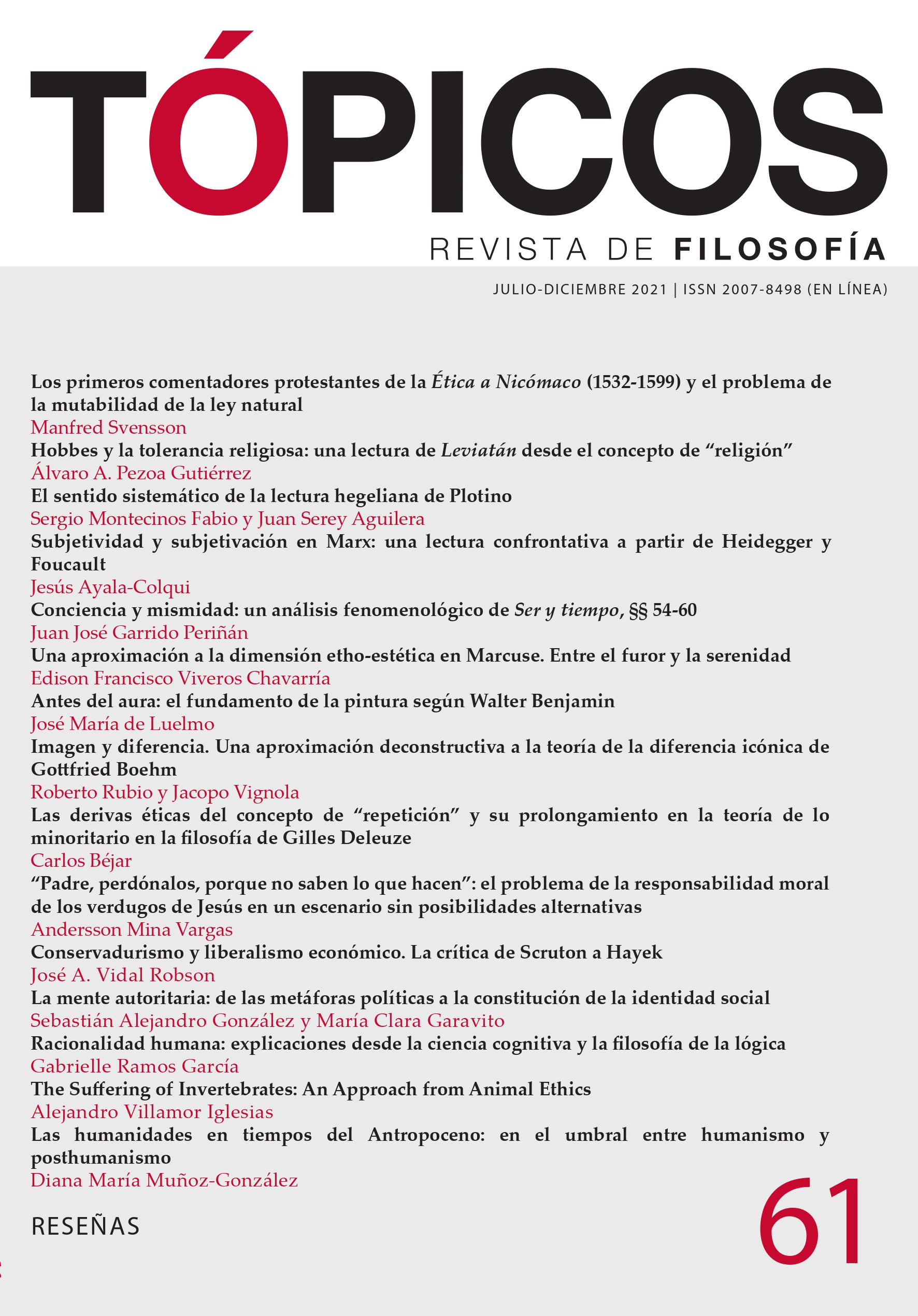Publicado 2021-06-23
Palabras clave
- repetición,
- Deleuze,
- minoritario,
- ética
Derechos de autor 2021 Tópicos, Revista de Filosofía

Esta obra está bajo una licencia internacional Creative Commons Atribución-NoComercial-SinDerivadas 4.0.
Cómo citar
Resumen
Junto con el concepto de “diferencia”, el concepto ontológico de “repetición” tiene en la obra de Deleuze muchas derivas importantes. En este artículo me propongo analizar el concepto de “repetición” que aparece en Diferencia y repetición, revisando para ello las filosofías precursoras de Kierkegaard, Nietzsche y Péguy en relación con dicho concepto. Se verá que la repetición, aunque en principio es una categoría ontológica que cumple un eminente papel en relación con el tiempo y la constitución de la subjetividad, posee también una deriva ética que cuestiona las pretensiones de la ley moral. Es esta deriva ética la que pone al concepto de “repetición” en conexión con temas y problemas que aparecerán más tarde en las obras que Deleuze escribió junto a Guattari y que se inscriben de lleno en un pensamiento de corte ético-político. Mostraré para ello, al final del artículo, cómo el entramado de nociones que conforman el pensamiento sobre la repetición está implícito en la dupla minoritario-mayoritario de sus obras de madurez.
Referencias
- Carmona Hurtado, J. (2016). El arte de la tercera repetición. La cuestión de la efectividad en Différence et répétition de Gilles Deleuze. Bajo palabra. Revista de Filosofía, 2(12), 91-98.
- Castrillo Mirat, D. (2000). Prólogo. En F. Nietzsche, La voluntad de poder. (pp. 9-23). Edaf.
- D’Agostini, F. (2010). Analíticos y continentales. Guía de la filosofía de los últimos treinta años. Cátedra.
- Deleuze, G. (1969). Logique du sens. Les Éditions de Minuit.
- Deleuze, G. (2006). Exasperación de la filosofía. Equipo Editorial Cactus (trads.). Cactus.
- Deleuze, G. (2008). Nietzsche y la filosofía. C. Artal (trad.). Anagrama.
- Deleuze, G. (2009). Spinoza: filosofía práctica. A. Escohotado (trad.). Tusquets Editores.
- Deleuze, G. (2015). Différence et répétition. Presses Universitaires de France.
- Deleuze, G. y Guattari, F. (1978). Kafka. Por una literatura menor. J. Aguilar Mora(trad.). Ediciones Era
- Deleuze, G. y Guattari, F. (1980). Mil mesetas. Capitalismo y esquizofrenia. II. José Vázquez Pérez (trad.). Pre-Textos.
- Deleuze, G. y Guattari, F. (2009). ¿Qué es la filosofía? T. Kauf (trad.). Anagrama.
- Deleuze, G. y Parnet, C. (2004). Diálogos. J. Vázquez Pérez (trad.). Pre-Textos.
- Deuchars, R. (2019). Creating Lines of Flight and Activating Resistance: Deleuze and Guattari’s War Machine. AntePodium. Online Journal of World Affairs.
- Ferrater Mora, J. (2009). Diccionario de filosofía. Tomo IV. Ariel.
- González Robles, J. (1967). Péguy filósofo. Revista de Filosofía de la Universidad de Costa Rica, 20, 61-74.
- Kierkegaard, S. (1958). Temor y temblor. J. Gringberb (trad.). Losada.
- Kierkegaard, S. (1997). La repetición. Un ensayo de Psicología experimental. K. Astrid Hjelmstrom (trad.). JVE Psiqué.
- Lapoujade, D. (2016). Deleuze, los movimientos aberrantes. P. Ires (trad.). Editorial Cactus.
- Mendoza Valdés, R. (2005). Ética de la repetición, o el pensar del rizoma. Pensamiento. Papeles de Filosofía, 4, 80-86.
- Nietzsche, F. (2000). La voluntad de poder. A. Frouff (trad.). Edaf.
- Nietzsche, F. (2006). Fragmentos póstumos (1885-1889). Volumen IV. J. L. Vermal y J. B. Llinares (trads.). Tecnos.
- Parr, A. (2010). The Deleuze Dictionary. Edinburgh University Press.
- Patton, P. (2013). Deleuze y lo político. M. Costa (trad.). Prometeo Libros.
- Péguy, C. (2009). Clío. Diálogo entre la historia y el alma pagana. L. Fólica (trad.). Editorial Cactus.
- Santaya, G. (2017). El cálculo trascendental. Gilles Deleuze y el cálculo diferencial. Ragif Ediciones.
- Somers-Hall, H. (2013). Deleuze’s Difference and Repetition. An Edinburgh Philosophical Guide. Edinburgh University Press.





